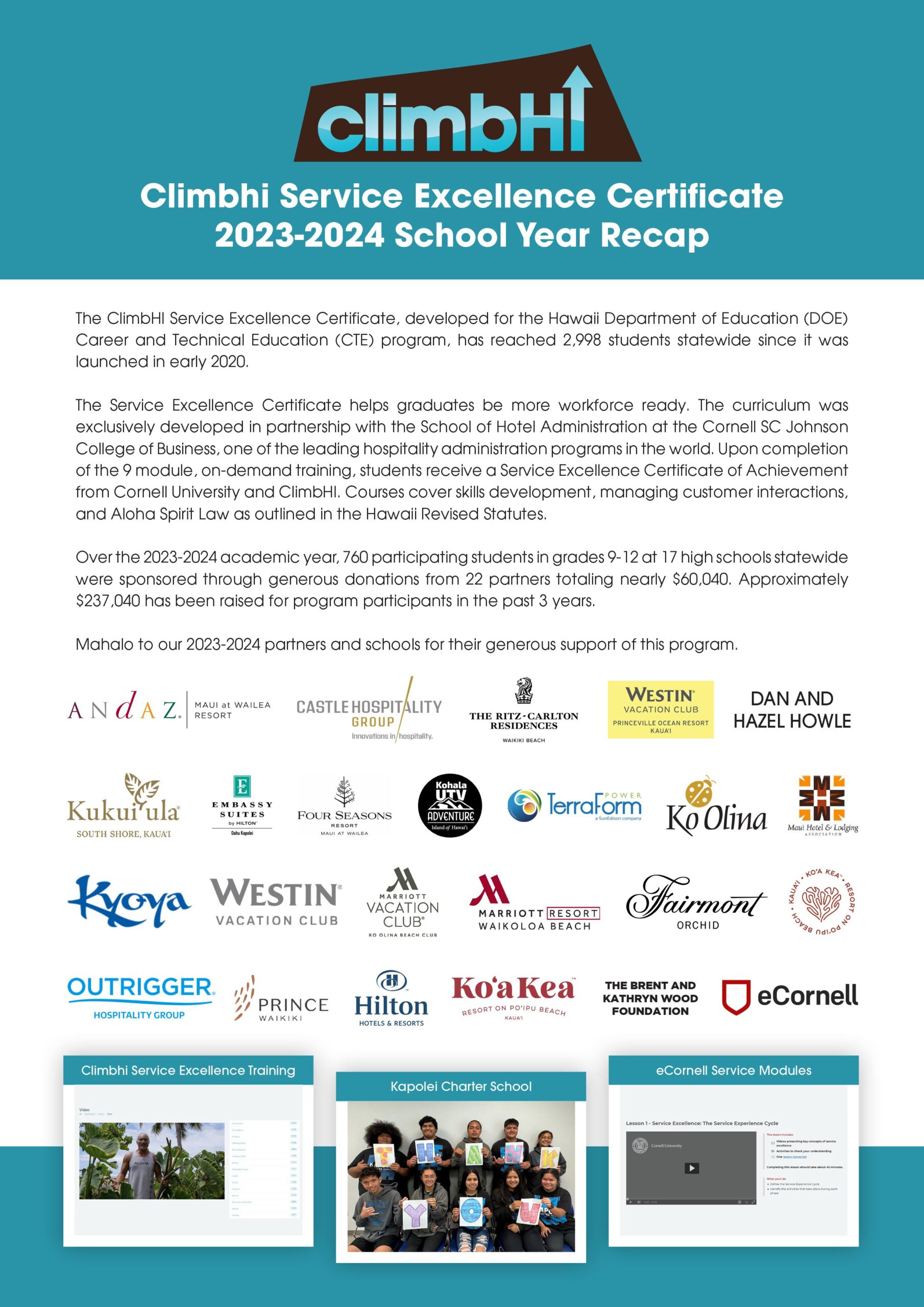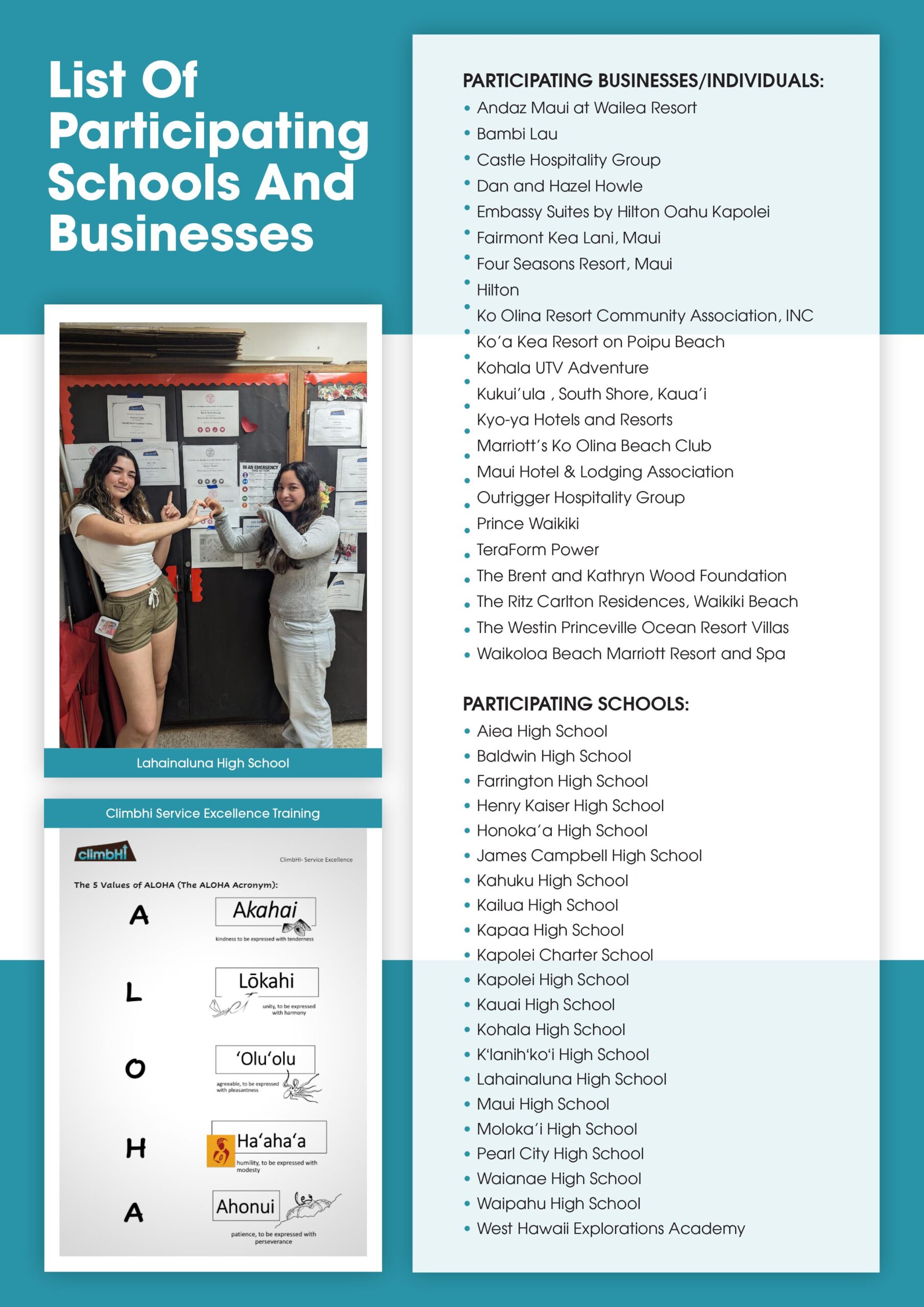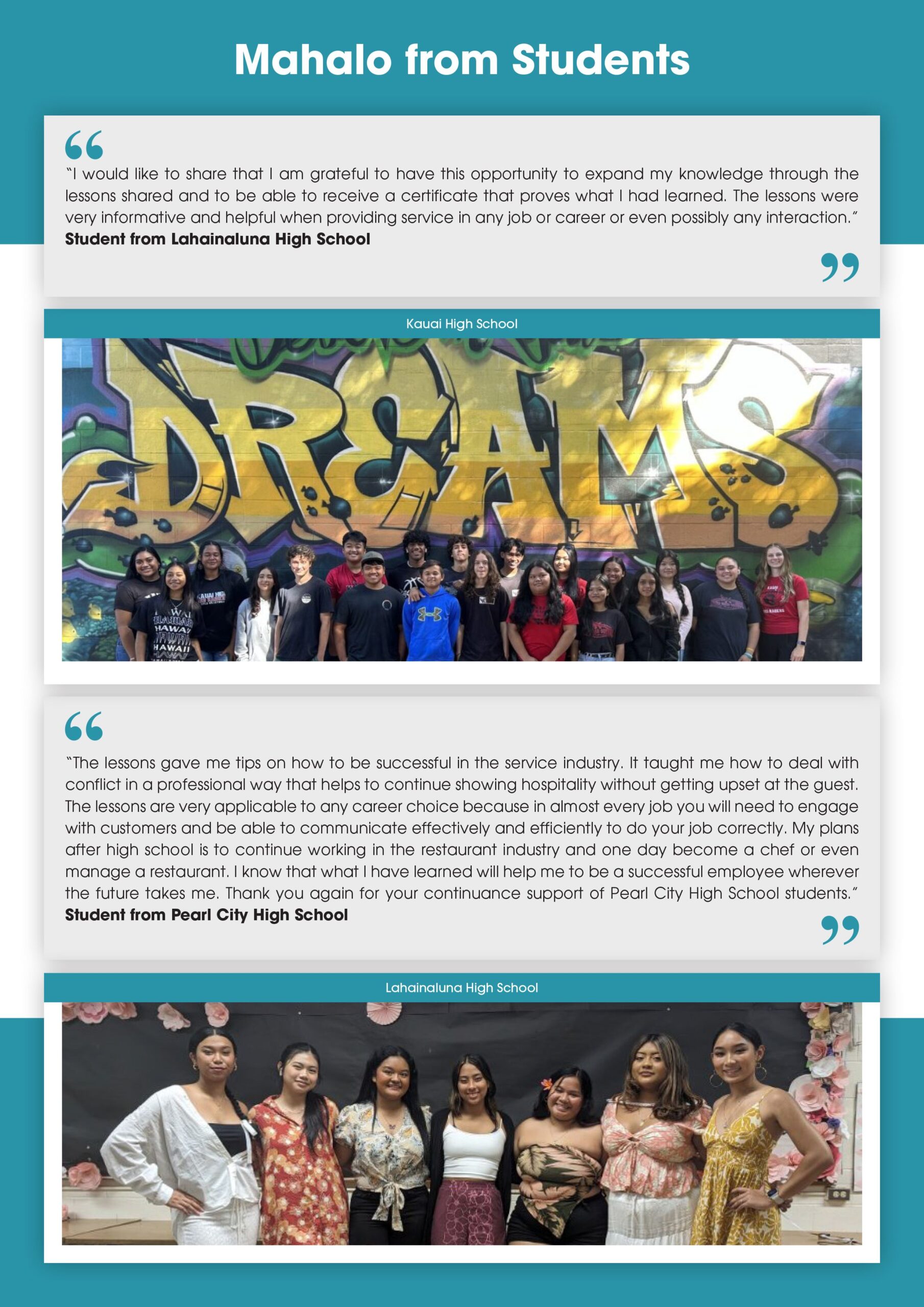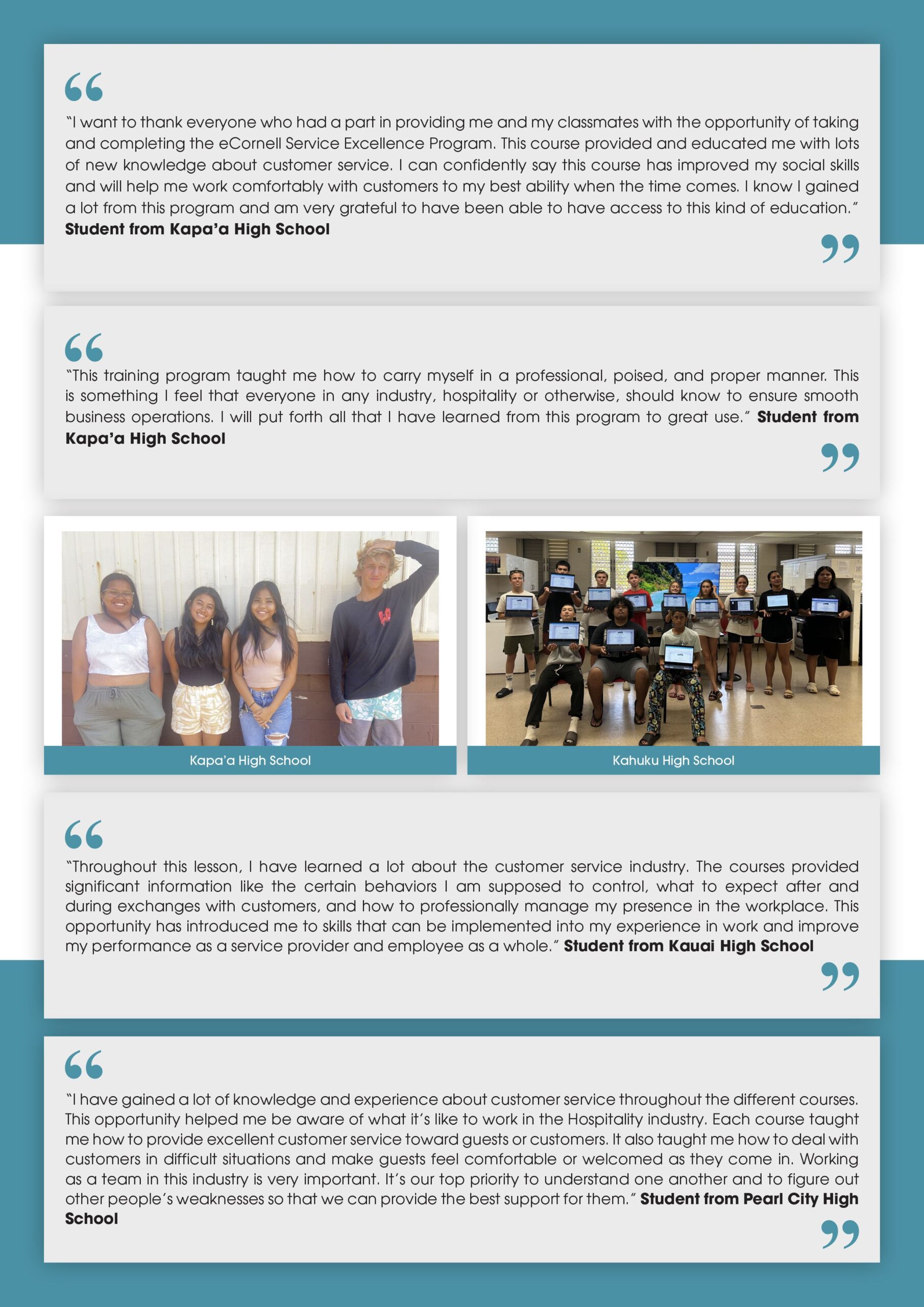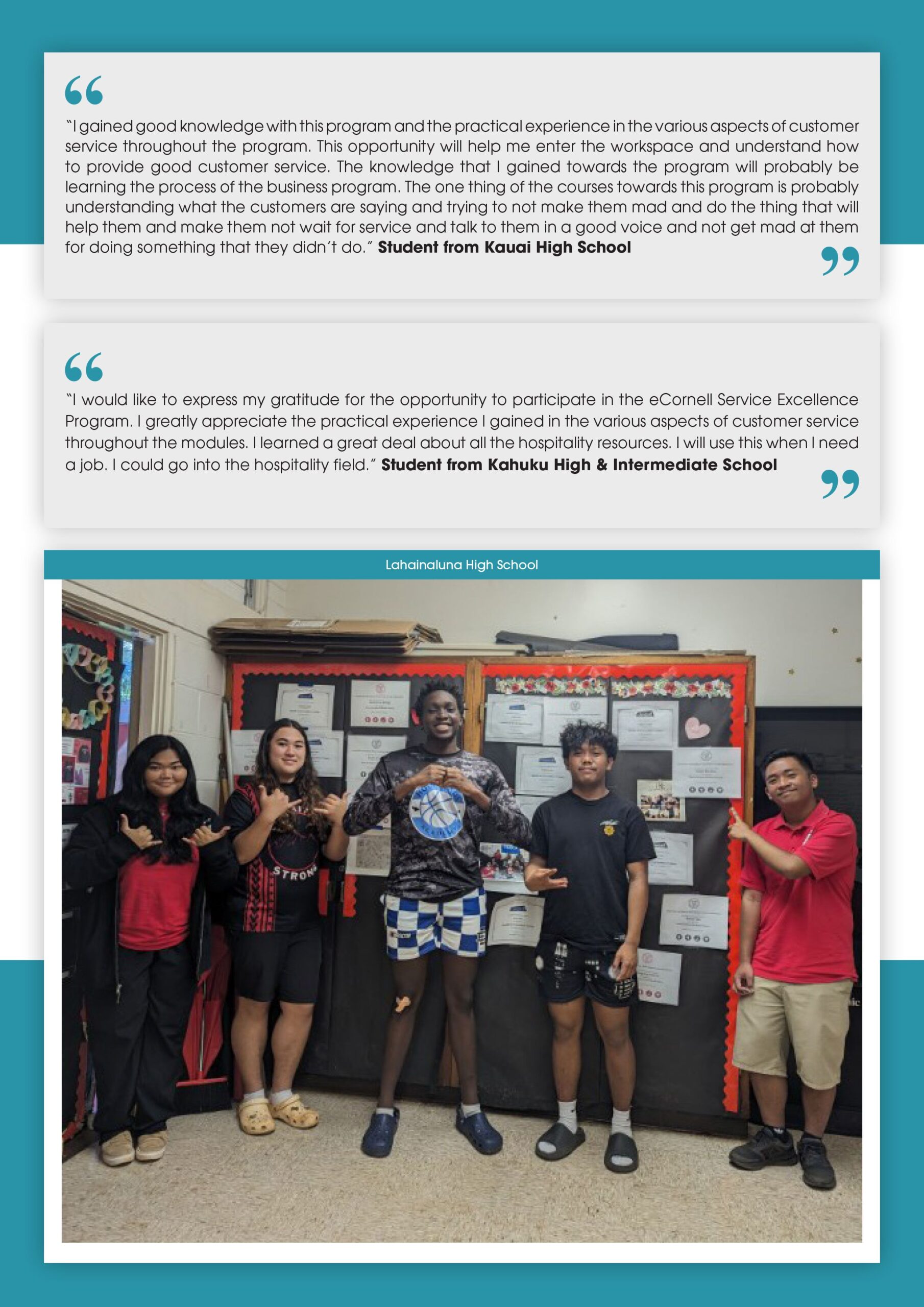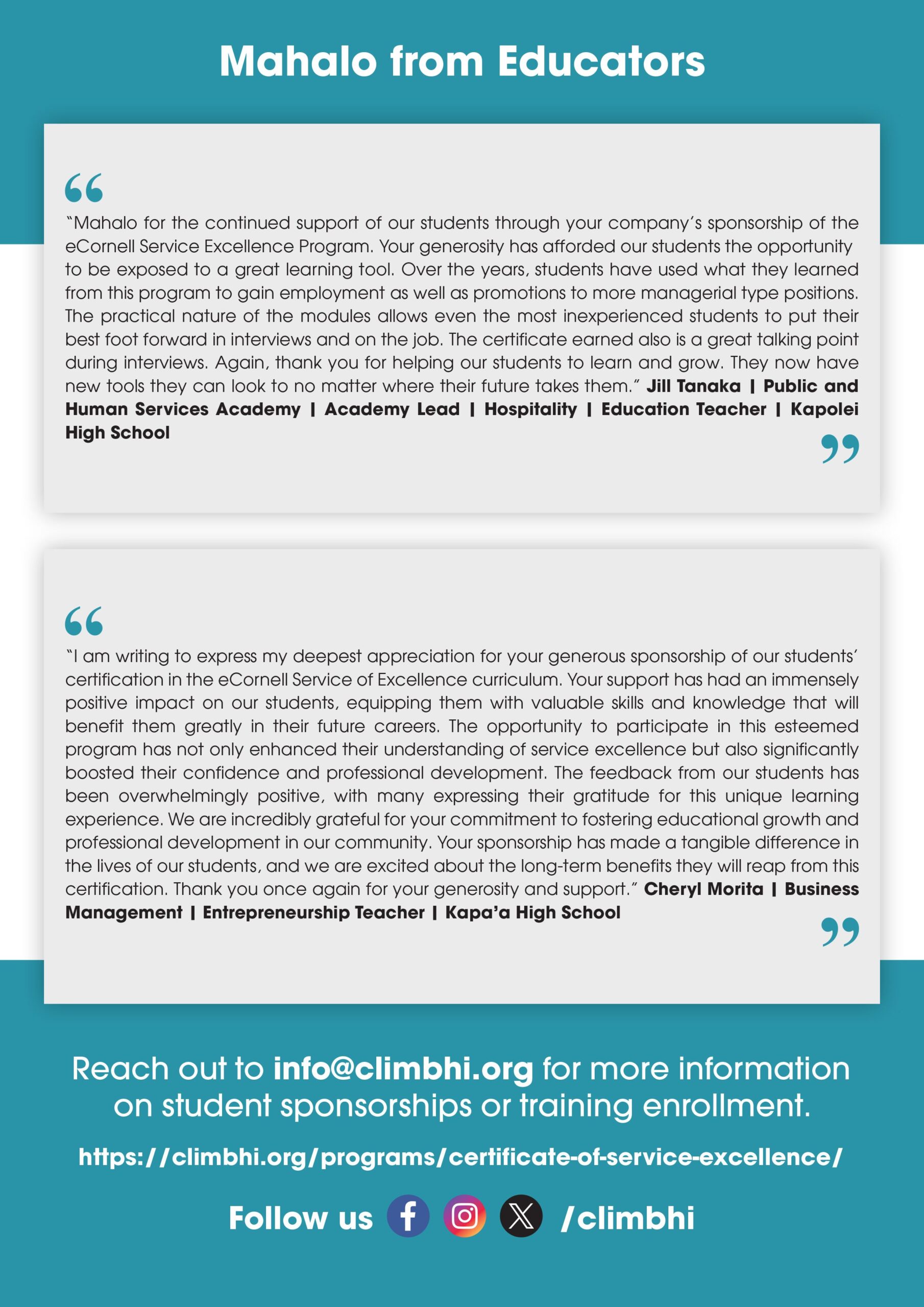Service Excellence Certificate
The Service Excellence Certificate helps graduates be more workforce ready. The curriculum was exclusively developed in partnership with the School of Hotel Administration at the Cornell SC Johnson College of Business, one of the leading hospitality administration programs in the world. Upon completion of the 9 module, on-demand training, students receive a Service Excellence Certificate of Achievement from Cornell University and ClimbHI.
Courses cover skills development, managing customer interactions, and Aloha Spirit Law as outlined in the Hawaii Revised Statutes.
Over the 2023-2024 academic year, 760 participating students in grades 9-12 at 17 high schools statewide were sponsored through generous donations from 22 partners totaling nearly $60,040. Approximately $237,040 has been raised for program participants in the past 3 years.
Mahalo to our 2023-2024 partners and schools for their generous support of this program.
ClimbHI developed a Human Services (Business and Hospitality) Pathway On-Demand Certificate for high school students throughout the state under a contract with the Hawaii State Department of Education (DOE) and with support from the Hawaii Tourism Authority (HTA).
Launched in January 2020, the Service Excellence Certificate of Achievement curriculum provides fundamental skills for employment in the hospitality industry and beyond. The training marries our unique philosophy for world class service rooted in the Hawaiian culture with world renowned hospitality education from Cornell University. The curriculum was exclusively developed in partnership with the School of Hotel Administration at the Cornell SJ Johnson College of Business, one of the leading hospitality administration programs in the world, for the DOE’s Career and Technical Education (CTE) program. Upon completion of the program’s 9 lessons, students receive a Service Excellence Certificate of Achievement from Cornell University and ClimbHI. The program served 683 students and teachers in its first year, and is currently available for DOE CTE students.
To receive the ClimbHI Service Excellence Certificate, the following online modules must be completed (each lesson will take up to 45 min to complete):
- Aloha Spirit Lesson/Quiz
- eCornell 8 modules
Upon completion, both the ClimbHI and Cornell University certificates will be made available to students electronically.
Program Details
Overview of Lessons (Lessons can be taken in any order).
9 Lessons Total8 Cornell University’s School of Hotel Administration Service Excellence Online Training Lessons: Lessons can be accessed via desktop, laptop, tablet, or mobile device.
Delivering great customer service isn’t simply a skill that some possess and others do not. The Cornell University Service Excellence On-Demand Training provides organizations and team members with a framework for critical thinking and techniques that can be adopted by customer-facing employees in any role. It provides tools that can be applied to any situation involving internal or external customers.
Blended learning approach: Employees first learn, practice, and demonstrate service-excellence concepts and strategies through eight online, self-paced lessons. Supervisors and managers then facilitate face-to-face meetings with their teams using the detailed Service Excellence Workshop Guide. The Workshop Guide includes instructions and pointers for facilitators as well as detailed questions to ensure that employees connect service-excellence concepts to the execution of their daily duties, tasks, and responsibilities. Concepts and strategies learned in the online portion are contextualized at the unit level to improve retention and reinforce company standards.
Foundations
- Cornell Service Experience Cycle: This cycle defines all customer service experiences including in-person, over the phone, or digital platform interactions. Understanding the cycle provides critical opportunities to address flaws and improve service, and ensures that customer needs are being properly met during real-world interactions.
- Your PERC Toolkit: Identify the four critical characteristics of Your PERC Toolkit and demonstrate Poise, Empathy, Resourcefulness, and Caring throughout the work environment and during customer interactions.
Skills Development
- Contextual Sensitivity: Define and look for customer and environmental clues. Use these clues to assess situations and adapt and customize service strategies throughout the Service Experience Cycle.
- Anticipating Needs: Explore proactive versus reactive styles and the benefits of acting with a proactive approach. Leverage skills to identify areas of improvement in the customer experience and the employee workday experience.
- Communication: Share information and engage more effectively through an understanding of how audience, message, and method of delivery influence how well other people receive your communication. Explore written, verbal, and non-verbal communication methods. Identify distractions in communication styles that may cause misunderstandings.
Managing Customer Interactions
- Listen, Observe, Ask: Gain practical strategies to make the most of each customer interaction. Use active listening techniques and apply question words to problem-solve and practice thorough communication. Adjust your response to changing customer clues.
- Strategies for Conflict Resolution: Conflict is a part of the workplace; understand how it is also a unique type of customer exchange. Know how to stay safe in difficult interactions and reach out to appropriate resources when situations escalate. Identify opportunities for apologies and strategies for times when an apology is not appropriate. Practice respect for emotions, both your own and your customer’s.
- Strategies for Service Recovery: Service recovery is a necessary and important step in every organization. Identify types of service failures through the Failure Matrix as well as appropriate responses for each type of failure. Think outside the box; consider new and novel approaches for service recovery.
1 Aloha Spirit Lesson: Learn not just the values of Aloha, but learn how to apply them in daily life. “The “Aloha Spirit” is the coordination of mind and heart within each person. These are the traits of character that express the charm, warmth, and sincerity of Hawai’i’s people”. The values will be explored in great detail and included in each lesson as Hawaiian hospitality and the Cornell University School of Hotel Administration’s lessons go hand in hand. The explanations here are broken out into individual lessons but the learnings will bleed into each lesson as the Aloha Spirit and service excellence are one and the same.
Duration of Lessons: The 8 Cornell University’s School of Hotel Administration and 1 Aloha Spirit Lessons are each 45 min – 1 hour.

